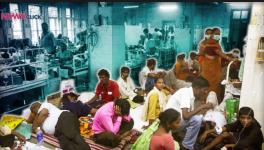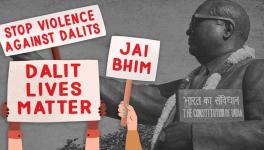Budget 2021: Where Are the Smart Cities and Urban Employment Guarantee, FM and PM?
The Budget 2021-22 was placed in the background of the ravaging pandemic and with a hope that the urban centres, which saw the worst kind of reverse migration in recent times would be targeted. However, the Union Budget belies all hopes of the poor, especially the urban poor and has been overwhelmed by a large section of the corporate giants.
“A budget to boost economic recovery,” said Nirmal Jain, chairman of Indian Infoline (IIFL); “Sensex skyrockets 2,315 points on Budget Cheer”; “Unmatched Times, Extraordinary Budget,” said the Hindujas group; “A Vision Statement for the country,” said the Birlas; “An expansionist and bold Budget,” said Karnad, MD of HDFC; “Aiming for growth of better quality,” termed CRISIL head, Mehta; “Atmanirbhar Healthcare,” said Pretha Reddy, vice-chair, Apollo hospital; “Historic budget with growth at its centre,” was the opinion of Uday Kotak, president Chamber of Commerce and Industry. Quite obvious, but almost all of them have been giving similar statements to the budgets in the past as well. So, what is different and new?
Apart from the various heads, especially social welfare sectors, which have been hit by the budgetary allocations and reduction in subsidies, urban development is another area which has been neglected. Though, as pointed out, the more than 9,000 urban centres – comprising urban agglomerates; Tier 1, 2 and 3 cities; small towns and other non-statutory urban settlements, which hold nearly 34% of the Indian population – were supposedly perceived to be prioritised in meeting their economic challenges through budgetary support, especially after the lessons learnt from the pandemic.
However, all such hopes have fallen flat. I remember Venkaiah Naidu complaining in one of the conferences, when he was the Urban Development Minister, saying that the cities do not have money so they approach the states, the states also are financially constrained, so they look at the Centre and the Centre is also in a financial mess so it looks at the multilateral agencies. In this Budget, this has come more vividly to the fore. The Centre has relied more on private capital, both foreign and domestic, to invest in cities and ameliorate the problems there. Will this happen? It has not happened in the past and there are no chances of it happening now!
Also read: Unsustainable Cities: Stop Piecemeal Approach, Constitute National Commission on Urbanisation
The total budgetary outlay for urban development is Rs 54,581 crore, which is just 9% above the budget estimates (BE) of 2020-21. However, the revised estimates (RE) for the previous year, too, fell far below to Rs 46,791 crore. There is no chance and scope of even meeting the BE of 2021-22. But then what is this amount at all? It is just 1.5% of the total budgetary allocation, though 34% of the people live in urban centres and the cities contribute to nearly 67% of the GDP and 90% of total government revenues. In all this amount, BE 2021-22 falls short of the budgets of four metros of the country. So, what is in the offing we can easily make out.
Even in this Budget, there is a shortfall in the total grants outlay to the urban local bodies. There is a reduction from Rs 25,098 crore to Rs 22,114 crore, which is a fall of nearly 11%. This means that the urban bodies will be forced to shore up its resources through either user fees on various utilities, or other means taxing people more.
There is not a word on smart cities, the much-trumpeted flagship programme of Modi government. These smart cities were supposed to be the lighthouses for other cities in the country. The Budget is completely silent over it owing to the fact that it has become one of the biggest embarrassments to the Modi government. Likewise, the Budget on AMRUT (Atal Mission for Rejuvenation and Urban Transformation) remains stagnant at Rs 13,750 crore.
The Finance Minister’s speech elaborates on the direction which will be followed for urban development. She said, “We will work towards raising the share of public transport in urban areas through expansion of metro rail network and augmentation of city bus service… The scheme will facilitate deployment of innovative PPP (public private partnership) models to enable private sector players to finance, acquire, operate and maintain over 20,000 buses. The scheme will boost the automobile sector, provide fillip to economic growth, create employment opportunities for our youth and enhance ease of mobility for urban residents.”
As pointed out above, the model of development is PPP, which has been an utter failure in the urban development sector in the past. A similar model is being suggested for urban rental housing instead of government providing housing and labour hostels to the urban poor.
Also read: Finally, Modi Govt Wakes Up to Urban Joblessness – Or Does it?
The lockdown and the resultant reverse migration made people realise that the present model of urban development and governance cannot and is not sustainable, and hence, two important interventions were demanded universally across sectors. These sectors are employment guarantee in urban areas and housing; and rental and labour hostels.
A single line on rental housing in the Budget goes as, “We are committed to promote supply of Affordable Rental Housing for migrant workers. For this, I propose to allow tax exemption for notified Affordable Rental Housing Projects.” Thus, it is only tax exemption to these projects that is the concern of this government. Who are constructing these projects? Once again these are done carried out through the PPP model, whereas the government should have used funds to construct labour hostels and rental houses in the manner in which Kerala state government did or what was done almost a century ago in Shimla.
Urban employment guarantee scheme emerged as the sector that required to be directly addressed during the pandemic period. It is not that the ruling Bharatiya Janata Party has not been speaking about it. In fact, since the 2009 election campaign, the BJP has been promising for an employment guarantee scheme. However, the Budget kept silent on it.
Various groups and urban practitioners have been demanding the urban employment guarantee scheme in tandem to the Mahatma Gandhi National Rural Employment Guarantee Schemd. The Centre for Monitoring India Economy data has shown that India is facing the worst form of the unemployment crisis. The unemployment rate had crossed 24% during the pandemic and the labour participation rate, too, is low and has not reached the pre-pandemic levels. It is estimated that nearly 20 million people lost their jobs during the pandemic. The employment scenario was not good even before the pandemic.
In such a situation, the government was expected to ensure direct cash transfers and provide employment guarantee scheme in the towns which would have created a huge demand in the economy. More than that, it would have also addressed many issues that are faced in urban centres from civil works to administrative tasks. This would have also helped in the creation of assets in the urban centres, however, the government is not interested in mitigating the challenges that are faced by the poor and especially the urban poor.
The prose read by the FM depicts the outlook and mental attitude of this government, “A King/Ruler is the one who creates and acquires wealth, protects and distributes it for common good.” The prose may sound good but the intent of a ‘ruler- ruled’ combination is inherently deep in the mindset of this government, instead of a ‘citizenry’ conceptualisation, which accrued legitimate rights to the citizens. The ruled live because of the benevolence of the ruler. And that is what is being professed and practised.
Also read: Union Budget 2021-22 and the Issue of the Fiscal ‘Stimulus’
(The writer is former deputy mayor of Shimla. The views are personal.)
Get the latest reports & analysis with people's perspective on Protests, movements & deep analytical videos, discussions of the current affairs in your Telegram app. Subscribe to NewsClick's Telegram channel & get Real-Time updates on stories, as they get published on our website.























